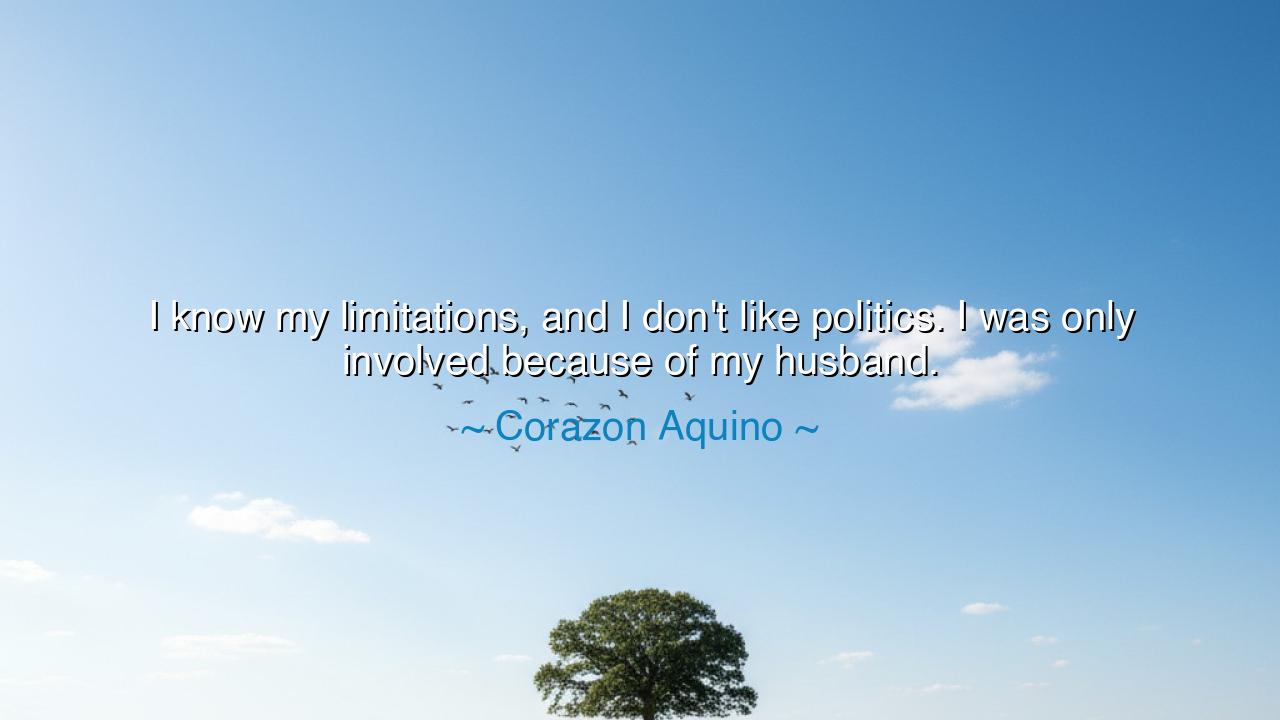
I know my limitations, and I don't like politics. I was only
I know my limitations, and I don't like politics. I was only involved because of my husband.






Humility is the mark of a true leader, for those who do not seek power are often the most worthy to wield it. When Corazon Aquino, the first female president of the Philippines, declared, “I know my limitations, and I don't like politics. I was only involved because of my husband,” she spoke from a place of deep sincerity and sacrifice. Her words reflect the heart of one who did not hunger for fame or dominion, but who stepped into the arena of politics out of duty and love, compelled by forces greater than personal ambition.
At the heart of this quote lies the recognition of limitations. Aquino understood herself and her strengths, and she admitted her discomfort with the rough, often ruthless world of politics. Such self-awareness is rare among leaders, for many are blinded by ambition or pride. Her reluctance reveals a profound truth: the most dangerous rulers are often those who crave power, while the most just are those who take it reluctantly, for the sake of others. Wisdom begins with knowing one’s limits, and from this humility springs authentic leadership.
The origin of Aquino’s words can be traced to one of the most turbulent chapters in her nation’s history. Her husband, Benigno “Ninoy” Aquino Jr., was a courageous critic of the Marcos dictatorship, a man who fought for democracy and paid for it with his life when he was assassinated in 1983. In the wake of his death, Corazon was thrust into the spotlight. Though she had never sought political power, the people saw in her a symbol of hope and integrity. She took up the banner of reform not because she desired it, but because her husband’s dream, and the cries of a suffering nation, demanded it.
History reveals how her reluctant rise changed the fate of her country. Through the People Power Revolution of 1986, millions gathered peacefully to oppose tyranny. Aquino, once a quiet figure in the shadows, stood at the forefront, her courage inspiring an entire nation. Though she disliked politics, she understood that leadership was not about liking the task, but about answering the call of history when no one else could. In this way, her very reluctance gave her the moral strength to lead.
Aquino’s words are also a lesson for all who may feel small or unprepared in the face of great challenges. One need not be perfect or eager to change the world. Sometimes, it is the humble heart, drawn reluctantly into service, that makes the greatest difference. Like her, we are reminded that service is born from love, and that even those who dislike the stage of politics can act as instruments of justice when destiny calls.
Let this teaching endure: true leadership is not born from ambition, but from sacrifice. As Corazon Aquino’s life shows, the greatest acts of courage may come from those who never wished to lead, but who, in moments of trial, rise above fear and doubt. Her legacy calls us to remember that even amidst the shadows of politics, humility and love can light the path toward freedom.






TVLau Thi Vang
I find Corazon Aquino’s view on politics quite relatable. There are many people who are forced into roles they didn’t seek out, often due to family or societal pressures. Does her reluctance suggest that politics could be better if more people were genuinely passionate about it? Or, do we need people like her—those who step up despite their personal feelings—because sometimes the most necessary roles are those that don’t feel natural?
PTphuong thao
Reading this quote from Corazon Aquino made me think about how politics can sometimes feel like a duty rather than a choice for certain people. It also raises the issue of whether individuals who enter politics reluctantly can still bring about meaningful change. Does this reluctance to engage with politics affect the way they govern, or can they still be effective even without enthusiasm for the political process?
NNNhi Nguyen
It’s so interesting to hear Corazon Aquino speak so candidly about politics. If she didn’t enjoy it, but still played such a pivotal role, does that suggest a kind of resilience or sacrifice? Could it be that some of the best leaders are those who are pushed into leadership out of necessity or loyalty, rather than personal ambition? And how does this affect their approach to leadership—does it make them more relatable or more hesitant?
TTNguyen Thanh Tung
Corazon Aquino’s comment is really thought-provoking. She knew her limitations and chose to step into politics for her husband, which raises the question: can someone be an effective leader if they’re only involved because of external factors rather than genuine desire? Does it mean that politics might not always attract the people who truly want to change things, but rather those who are driven by circumstances?
VATrinh Van Anh
Corazon Aquino's honesty about her involvement in politics is refreshing, especially when she admits it wasn’t something she initially sought out. It makes me think about how many people get into politics due to external circumstances rather than personal passion. If she didn’t like politics, was her involvement more about fulfilling a responsibility or a sense of duty to her late husband? How often do people enter political roles because of their personal relationships rather than their own convictions?